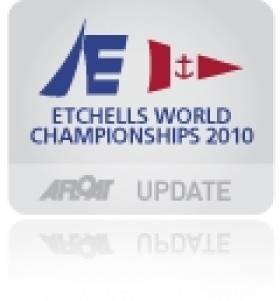Displaying items by tag: Fingal Couny Council
Abandonment helps Bertrand hold Etchells lead
Australia's John Bertrand retained his grip on the World Etchells Championship title at Howth but he needed the abandonment of the eighth race in the series due to lack of wind to maintain that position with a day to go.
A fourth in the first race of the day with his main rival Ante Razmilovic two places ahead reduced his overall lead to five points but it could have been much worse. He had a disastrous start to the race, languishing in the bottom half of the 41-boat fleet for the first time in the series, and any failure to get into the top half-dozen by the end of the race would have had a major impact on the leadership.
The day started well for Eamonn O'Nolan of the RORC. Having recorded a second and a fourth the previous day, he went even better by winning the seventh race with something to spare. Although he trailed Marvin Beckmann of Houston around the first windward mark after a 2.5 mile beat in a moderate northerly breeze, he gained the upper hand on the downwind leg and never looked back, increasing his lead on each leg to the finish. Ante Razmilovic, who has been highly consistent throughout the series, with only one result outside the top five, also edged past Beckmann downwind and kept in touch with the leader to the finish.
The Texas crew held on to third despite the challenge of championship leader Bertrand, followed closely by Laurence Mead of Royal Corinthian YC for a good fifth while sixth for Jake Gunther moved the Melbourne man up to third overall after seven races. The result also narrowed Bertrand's leading margin to five points while Nils Razmilovic had another poor finish to drop three places down the leader-board.
As forecast, the wind veered and dropped for the second race of the day with only 8 knots on the first beat. The light conditions clearly suited the Razmilovic brothers, with Ante and Nils rounding the windward mark in that order, followed by American Argyle Campbell and Damien King of Australia, the latter keen to make up for a calamitous morning race. For series leader Bertrand, it was a first leg to forget as he rounded the wing mark in the bottom half of the 41-boat fleet.
However, with winds dropping to 2 knots and a tide taking the fleet away from the next mark, PRO David Lovegrove was left with no alternative but to abandon the race at 1500hrs. A subsequent protest seeking redress by a number of competitors against the race officer was denied. Two races will now be sailed on Saturday (28th), with the first starting at 1100hrs.
Etchells World Championship – overall standings after 7 races:
John Bertrand (Australia) – 13 points Ante Razmilovic (Britain) – 18 points Jake Gunther (Australia) – 31 points Damien King (Australia) – 34 points Eamonn O'Nolan (Britain) – 40 points Nils Razmilovic (Singapore) 41 points
Follow the event on Twitter on the championship website – www.etchellsworlds2010.org





























































